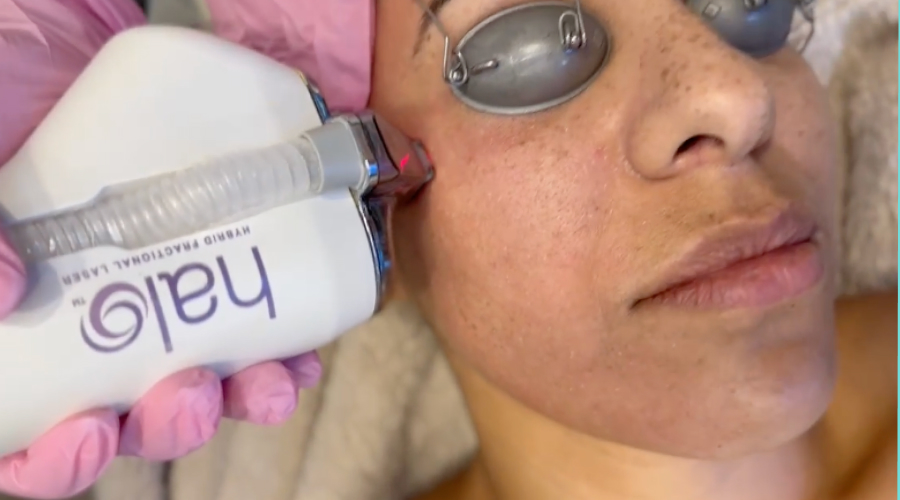Melasma is a common skin condition that manifests as dark, discolored patches on the skin, often appearing on the face, but can also develop on other areas exposed to the sun, such as the neck and arms. This hyperpigmentation is primarily a cosmetic issue but can cause significant distress due to its visibility. While melasma can affect anyone, it is particularly prevalent among women, especially those with darker skin types. It is most commonly triggered by factors such as sun exposure, hormonal changes, and genetic predisposition.
What Causes Melasma?
Melasma occurs when melanocytes, the pigment-producing cells in the skin, become overactive, leading to an excess production of melanin. This overproduction can be triggered by a variety of factors, including:
- Sun Exposure: Ultraviolet (UV) light from the sun stimulates melanocytes, exacerbating melasma. Even brief sun exposure can worsen existing melasma or trigger its onset.
- Hormonal Changes: Hormonal fluctuations, particularly during pregnancy, are a significant trigger for melasma. The condition is so closely associated with pregnancy that it is often referred to as “the mask of pregnancy.”
- Genetics: Individuals with a family history of melasma are more likely to develop the condition.
Melasma and Pregnancy: A Common Concern
During pregnancy, women experience numerous hormonal changes, including increased levels of estrogen and progesterone. These hormones can stimulate the production of melanin, leading to the development of melasma. Research shows that 50% to 70% of pregnant women may develop melasma (Source: Journal of the American Academy of Dermatology).
Melasma during pregnancy typically appears as dark, symmetrical patches on the face, particularly on the cheeks, forehead, and upper lip. While these patches may fade after pregnancy, they can persist for years without proper care.
Effective Melasma Treatment Options
Managing melasma can be challenging, but there are several treatment options available that can help reduce its appearance and prevent it from worsening. Here are some effective strategies:
- Daily Sunscreen Use: Sun exposure is the leading aggravator of melasma. Therefore, using a broad-spectrum sunscreen with an SPF of 30 or higher every day is crucial, even on cloudy days or when indoors near windows. Sunscreen should be reapplied every two hours when outdoors.
- Topical Treatments: Over-the-counter and prescription creams containing ingredients like hydroquinone, tretinoin, corticosteroids, and azelaic acid can help lighten melasma. These treatments work by inhibiting the production of melanin and promoting cell turnover.
- Advanced Treatments at NewBeauty:
- Laser and Intense Pulsed Light (IPL) Therapy: At NewBeauty, we offer advanced laser and IPL treatments that target hyperpigmentation, breaking down excess melanin and promoting a more even skin tone. These treatments are particularly effective for stubborn melasma that doesn’t respond to topical treatments.
- Chemical Peels: Our chemical peels exfoliate the skin, removing the uppermost layers to reveal fresher, less pigmented skin beneath. This treatment also stimulates collagen production, improving overall skin texture and tone.
- Skin Care Routine with Specialized Serums: Incorporating serums containing ingredients like vitamin C, niacinamide, and tranexamic acid can help maintain skin clarity and prevent new melasma spots from forming. At NewBeauty, we can guide you in selecting the right products for your skin type.
- Avoid Skin Irritants: Using gentle, non-comedogenic skin care products is essential for those with melasma. Harsh ingredients can irritate the skin and exacerbate pigmentation issues.
- Professional Dermatological Care: Regular consultations with a dermatologist are key to managing melasma effectively. At NewBeauty, our skin experts provide personalized care plans tailored to your unique needs, ensuring the best possible outcomes.
Special Considerations for Pregnant Women
If you are pregnant and dealing with melasma, it is important to approach treatment with caution. Many standard treatments for melasma, such as certain topical creams and laser therapies, may not be suitable during pregnancy. Always consult with a dermatologist before starting any new treatment. At NewBeauty, we prioritize your safety and will work with you to find the safest and most effective treatment options during this sensitive time.
Take Control of Melasma Today
Dealing with melasma can be frustrating, but with the right care and expert guidance, you can manage and even reduce its appearance. At NewBeauty, we are committed to helping you achieve your best skin. Schedule a consultation with us today and take the first step towards clearer, more radiant skin. Whether you are dealing with melasma during pregnancy or at any other stage of life, we are here to support you with customized treatments and professional care.





